Every day in South Africa, at least 15 women are murdered and more than 117 women report rape cases to police. For Women For Change, these numbers are not abstract statistics but a devastating reality witnessed daily as the organisation supports families shattered by femicide and advocates for survivors of brutal abuse and rape.
After years of documenting what it describes as a relentless war against women and children, the organisation says the country has reached a breaking point and more than one million people have now signed its petition demanding that Gender-Based Violence and Femicide (GBVF) be declared a national disaster.
Women For Change argues that the violence facing women is not only widespread but deeply personal. Most cases are committed by someone the victim knows: a partner, former partner, family member or friend. Countless women remain trapped in their own homes, silently enduring abuse behind closed doors.
Despite the 2020 adoption of the National Strategic Plan on GBVF, a policy framework intended to strengthen accountability and improve the state’s response, the organisation says implementation has lagged, funding has remained insufficient, and urgency from government has been absent.
Women For Change is planning a shutdown on Friday, 21 November, a campaign calling for stronger institutional accountability and better protection for victims of gender-based violence.
The action is set to take place ahead of the highly-anticipated G20 Leaders’ Summit in Johannesburg from 22 to 23 November. Institutions including Stellenbosch University and the Durban University of Technology (DUT) have changed their profile pictures on social media to purple, the campaign’s symbolic colour, to show solidarity with survivors.
Recent South African Police Service (SAPS) crime statistics from April 2023 to March 2024 paint an even more alarming picture. In this one-year period, 5,578 women and 1,656 children were killed, with femicide rising by a staggering 33.8% compared with the previous year. A total of 42,569 rape cases were reported, though it is estimated that up to 95% of rape cases never make it to police. Women For Change says this unprecedented increase in femicide has been met with silence, underscoring what it describes as a lack of accountability and political will.
The organisation is calling on the government to immediately declare GBVF a national disaster, arguing that such a declaration would compel the mobilisation of national resources on a scale that matches the severity of the crisis. It says the state must urgently fund the implementation of the National Strategic Plan, operationalise the National Council on GBVF, signed into law in May 2024 and commit to decisive reforms in the justice system.
Key demands include consistent opposition to bail in cases where victims and communities face imminent danger; life imprisonment without parole for those convicted of gang rape, femicide, and child sexual abuse or murder; and swift disciplinary action against police officers, court officials and social workers who mishandle GBVF cases. Women For Change also calls for the National Register for Sex Offenders to be made publicly accessible, arguing that transparency is essential to protecting women and children.
Education forms another critical pillar of its demands. The organisation says schools must introduce comprehensive GBV-focused curriculum content, including consent and gender equality, while government, businesses and media should support continuous awareness campaigns throughout the year, not only during the annual 16 Days of Activism period.
Women For Change maintains that ending GBV and femicide is not only a matter of safety but a fundamental human rights imperative. It argues that GBVF is the most extreme expression of gender inequality in South Africa and a pandemic that spans economic, cultural and social divides. As the petition surpasses one million signatures, the organisation says the message from the public is clear: the crisis can no longer be normalised, and urgent action can no longer be delayed.

